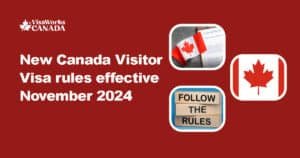A work permit serves as the golden ticket for individuals aspiring to join the Canadian workforce. It’s not just a mere piece of paper; it’s the gateway to new opportunities, experiences, and a promising future. Understanding who is eligible to work in Canada is paramount for those considering employment in the Great White North. Let’s delve into the intricacies of work permits and explore the criteria that determine eligibility.
Table of Contents
ToggleWork Permits
In Canada, work permits come in various forms, each tailored to meet different employment needs. Open work permits offer flexibility, allowing individuals to work for any Canadian employer. On the other hand, employer-specific work permits tie the individual to a particular employer. Additionally, post-graduation work permits provide opportunities for international students who have completed their studies in Canada.
Eligibility Criteria Overview
Before diving into the specifics, it’s essential to grasp the overarching eligibility criteria for obtaining a work permit. Age, citizenship, educational qualifications, and job offers from Canadian employers are key factors that influence eligibility. Let’s explore each criterion in detail to shed light on who can work in Canada.
Age and Citizenship Requirements
To be eligible for a work permit, individuals must meet certain age and citizenship requirements. While there’s no maximum age limit, applicants must be at least 18 years old to apply for a work permit. Moreover, applicants must be foreign nationals, as Canadian citizenship or permanent residency is not a prerequisite for obtaining a work permit.
Educational Qualifications
Educational qualifications play a crucial role in determining eligibility for a work permit in Canada. In most cases, applicants must have a high school diploma or equivalent to be considered. However, certain professions or industries may have specialized educational requirements, necessitating specific degrees or certifications.
Job Offer from Canadian Employer
One of the primary requirements for obtaining a work permit is a valid job offer from a Canadian employer. This job offer serves as evidence of the need for foreign talent in Canada and the employer’s willingness to hire the applicant. It demonstrates a genuine intent to employ the individual, thus contributing to the Canadian economy and workforce.
Labour Market Impact Assessment (LMIA)
In some cases, employers may need to obtain an LMIA to demonstrate that hiring a foreign worker will not have a negative impact on the Canadian labor market. This assessment evaluates various factors, including job availability, wages, and working conditions, to ensure that hiring a foreign worker will not displace Canadian workers.
Language Proficiency
Proficiency in English or French is essential for most work permit applications in Canada. Applicants may need to undergo language proficiency tests, such as the International English Language Testing System (IELTS) or the Canadian Language Benchmarks (CLB) exam, to demonstrate their language skills. Strong language skills are crucial for effective communication in the workplace and integration into Canadian society.
Health and Security Clearance
Applicants for work permits may be required to undergo medical examinations and obtain security clearances as part of the application process. These measures ensure that individuals entering Canada are in good health and pose no security risks to the country. It’s essential to meet health and security standards to be eligible for a work permit and ensure a smooth transition to life in Canada.
Financial Stability
Financial stability is another important criterion for obtaining a work permit in Canada. Applicants must demonstrate that they have sufficient funds to support themselves and any accompanying family members during their stay in Canada. This includes covering living expenses, such as accommodation, food, transportation, and healthcare, without relying on social assistance programs.
Duration of Work Permit
The duration of a work permit varies depending on the type of permit and the specific circumstances of the applicant. Work permits may be issued for a few months to several years, with options for extensions or renewals. It’s essential to understand the validity period of a work permit and adhere to any conditions outlined in the permit to avoid legal complications.
Application Process Overview
Navigating the application process for a work permit can be daunting, but understanding the steps involved can simplify the journey. The application process typically involves submitting the required documents, attending interviews or providing additional information if requested, and waiting for the application to be processed.
If you’re interested in visa services, guidance consultancy, expert talk, and more, feel free to reach out to VisaWorks Canada Ltd. for personalized assistance customized to your needs.
Let’s explore each step in detail to demystify the process.
Submission of Application
The first step in obtaining a work permit is completing the application form and gathering the necessary supporting documents. Applicants must provide accurate and truthful information to avoid delays or rejection of their application. Required documents may include a valid passport, job offer letter, educational certificates, language test results, and proof of financial resources.
Processing Time
The processing time for work permit applications varies depending on several factors, including the applicant’s country of residence, the type of work permit applied for, and the workload of the visa office processing the application. While some applications may be processed quickly, others may take several weeks or months to complete. Understanding the average processing time can help manage expectations and plan accordingly.
Interview or Additional Requirements
In some cases, applicants may be required to attend an interview or provide additional documentation as part of the application process. The purpose of the interview is to assess the applicant’s eligibility for a work permit and clarify any information provided in the application. Applicants should be prepared to answer questions about their qualifications, work experience, and intentions for working in Canada.
Approval and Issuance of Work Permit
Upon approval of the work permit application, applicants will receive a notification of approval and, if applicable, instructions on obtaining the physical work permit document. It’s essential to review the conditions outlined in the work permit and comply with any requirements to maintain legal status in Canada. Once in possession of the work permit, individuals can begin working for their Canadian employer and embark on their Canadian journey.
Benefits of a Work Permit
Securing a work permit opens doors to a myriad of benefits and opportunities in Canada. Beyond employment opportunities, work permit holders may be eligible for social benefits, such as healthcare coverage and access to education for dependents. Additionally, working in Canada allows individuals to gain valuable work experience, expand their professional networks, and immerse themselves in Canadian culture and society.
Challenges and Considerations
While obtaining a work permit in Canada offers numerous benefits, it’s essential to be aware of the challenges and considerations associated with working in a foreign country. Language barriers, cultural differences, and adjusting to a new work environment are common challenges that individuals may encounter. However, with proper preparation, resilience, and a positive attitude, these challenges can be overcome, paving the way for a successful and fulfilling experience in Canada.
Tips for a Successful Application
Navigating the work permit application process can be complex, but with the right approach, applicants can increase their chances of success. Starting early, gathering all required documents, and seeking professional assistance if needed are essential steps to ensure a smooth application process. Additionally, staying informed about updates to immigration policies and procedures can help applicants make informed decisions and avoid common pitfalls.
Conclusion
In conclusion, understanding who is eligible to work in Canada is crucial for individuals considering employment opportunities in the country. By meeting the age and citizenship requirements, possessing the necessary educational qualifications, securing a job offer from a Canadian employer, and fulfilling other criteria, applicants can increase their chances of obtaining a work permit and pursuing their career goals in Canada. While the application process may seem daunting, proper preparation, diligence, and perseverance can lead to a successful outcome and open doors to a bright future in the Great White North.








